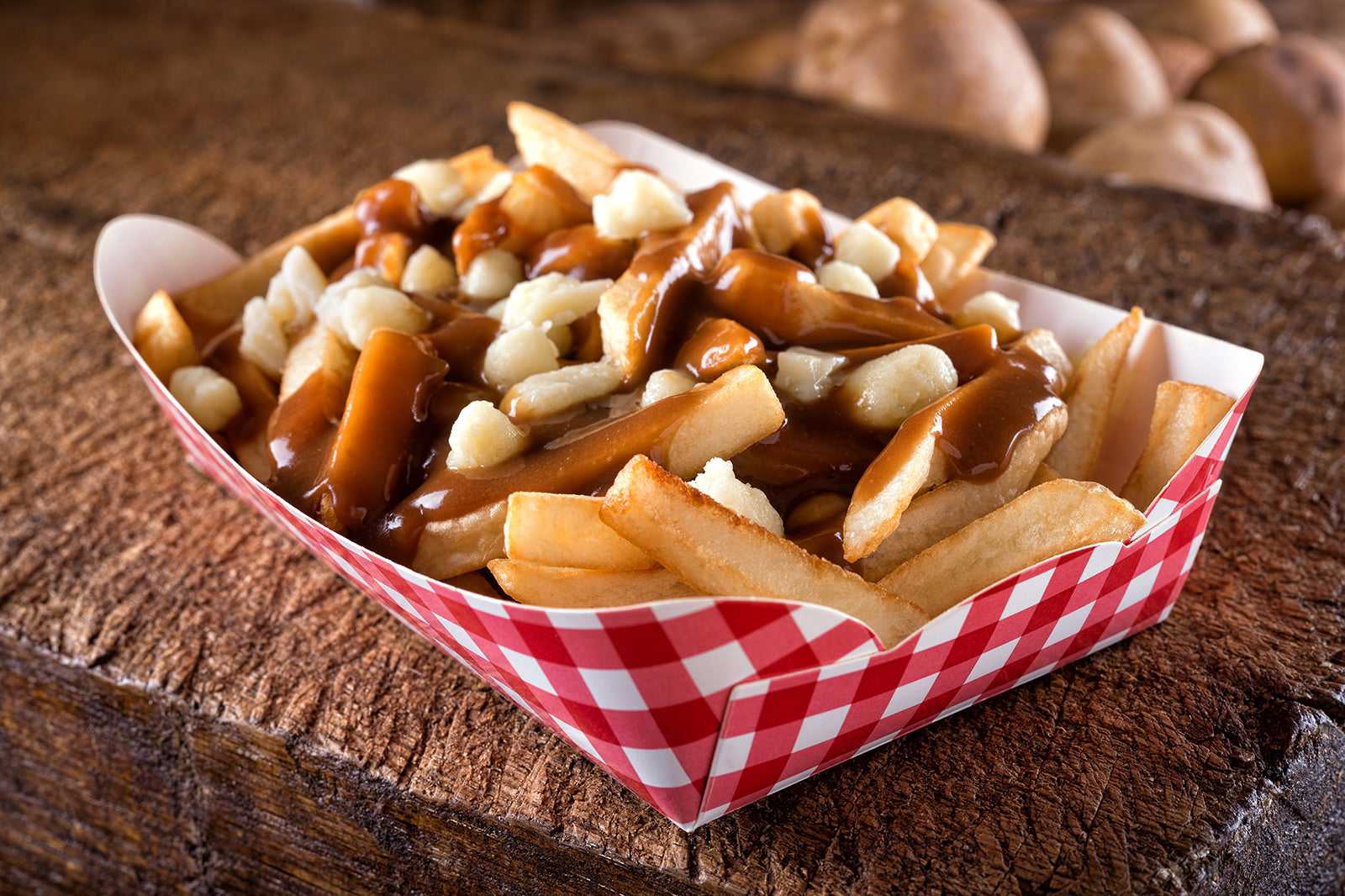The best local dishes from Quebec City range from decadent sugar-laden desserts to hearty vegetable-strewn soups. Not to be left out is the world-famous poutine – one of the Quebecois cuisine mainstays. As the capital of the enormous eastern province, Quebec City is a top spot to sample French-Canadian fare.
Centuries of French settlement made their mark on the local culinary culture, along with harsh winters that called for nutrient-dense foods. The result? Satiating European-infused comfort dishes that go down a treat on a cold day (or anytime, really). Read on to know what famous food locals love to eat in Quebec City.
- 1
Poutine (French fries with cheese curds)
A world-famous French-Canadian comfort food

- Alimentos
Poutine is a delightful treat that consists of thickly cut potato chips drizzled in gravy and smothered in semi-creamy cheese curds. Some locals would warn that it’s a terrible choice when you’re watching your waistline – it packs in plenty of calories. It means “mess” in Quebecois slang! It’s neither healthy nor aesthetically pleasing, but it is delicious.
While the dish is ubiquitous around Canada, it’s believed to have originated right here in Quebec. You’ll find poutine everywhere you look in Quebec City, from hole-in-the-wall takeaways to franchise branches and fancy upmarket digs. Innovative variations incorporate extra toppings like smoked meat, pulled pork, and streaky bacon.
- 2
Soupe aux pois (pea soup)
A historic vegetable soup

- Alimentos
Soupe aux pois is a hearty yet healthy pea soup dish that dates back to the colonisation era. Some 400 years ago, when Samuel de Champlain landed in New France, his ships were stocked full of salted meat and dried beans. Chefs cooked these non-perishable rations into a nourishing soup to feed the settlers – it’s also known as “habitant pea soup” after the early Quebecois habitants.
The dish steadily evolved as more ingredients became available. Most modern variations include salted pork, yellow peas, and veggies, simmered together in broth and seasoned with a bay leaf. It’s also a traditional sugar shack dish, often served as a main course.
- 3
Viande fumée (Montreal smoked meat)
A corn beef-style smoked meat commonly eaten in sandwiches

- Alimentos
While Viande fumée originated in Montreal, this Quebec classic is widely consumed in the capital, too. A Romanian immigrant named Reuben Schwartz started making this pastrami-like smoked meat in 1928, and it quickly became a provincial gastronomic institution. As it’s 100% kosher, the dish was a hit in the Jewish delicatessens of the era.
Viande fumée is a beef brisket left to marinate in herbs and spices for around 10 days. The tender, meaty morsel is then cured and smoked before sliced and served in firm rye-bread sandwiches. Pickles, coleslaw, peppers, mustard, and olives complete the package.
- 4
French-Canadian crêpes
A local rendition of the classic French crêpe

- Alimentos
French-Canadian crêpes are fluffy, pancake-like creations stuffed with sweet or savoury toppings. While both French and French-Canadian crêpes are made from buckwheat flour, there is a difference. The local variation is notably thicker, and its edges a wee bit crispier than the European version. Nonetheless, if you’ve had French crêpes before, you pretty much know what to expect.
The great thing about crêpes is their versatility. Sweet crêpes with goodies like strawberries, bananas, and whipped cream make for a delicious dessert. Or, if you need a hearty breakfast, order one with ham, cheese, poached egg, and Hollandaise. There’s a crêpe for every craving.
- 5
Tourtière (Quebecois meat pie)
A minced meat pie made around Christmas time

- Alimentos
Tourtière is a Quebecois-style meat pie prevalent around Christmas and New Year. Packed full of spiced pork or beef mince, the flaky, pastry-wrapped delicacy is a longstanding end-of-year tradition throughout Quebec. The dish goes by pâté à la viande in certain parts of the province.
Some chefs add vegetables such as diced potatoes and onions, plus spices like cinnamon, nutmeg, and cloves. Although variations exist between districts and families, the dish is almost universally eaten for brunch or breakfast towards the end of the year. For many Quebecois families, Tourtière forms part of their traditional Christmas celebrations.
- 6
Fèves au lard (baked beans)
Baked beans cooked in fatty hock and drizzled in maple syrup

- Alimentos
Fèves au lard is a fat-infused baked bean breakfast dish smothered in sweet maple syrup. The calorie-dense meal was originally intended to fuel early lumberjacks and hunters with sufficient energy for a long day of labour. Nowadays, the decadent day-starting dish is popular among all manner of Quebecois people, from office workers to hungover students.
The slow-cooked beans are soaked in salted pork or ham hock—au lard means “fatty” in English. A generous garnishing of local Quebec-style maple syrup infuses an abundance of sweetness into the dish. While it’s far from healthy, this satiating sugar shack meal is well worth trying.
- 7
Cretons
A pâte-style breakfast spread made from pork, onions, and spices

- Alimentos
Cretons is a tasty type of cold meat spread that’s smeared over toast at breakfast. The forcemeat-style pork mix features diced onions and spices like cinnamon and cloves for extra oomph – it’s akin to French rillettes.
Aside from toast, cretons taste delicious on crostini bread and crackers. And much like pâte, the spread goes down a treat on a shared charcuterie board, perhaps with a dash of mustard and a sliced pickle. Other common names for the dish include gorton, corton, and cretonnade.
- 8
Tarte au sucre (sugar pie)
A traditional French-style pie with plenty of maple syrup

- Alimentos
Tarte au sucre is a delicious sugar-rich pie popular around Quebec, including the capital. The traditional dessert dish is similar to the tarte au sucre of northern France, albeit with one key difference. Instead of using plain old ordinary sugar, the French-Canadian version packs on its primary product: maple syrup.
The single-crust pie typically comes chock-full of egg, flour, and oodles of gooey maple syrup. Some patisseries chuck in a generous serving of whipped cream for a fuller, fattier flavour. Like many of the best Quebecois dishes, you won’t see this one approved for those watching their weight.
- 9
Tire sur la neige (maple taffy)
A quintessentially Quebecois seasonal treat

- Alimentos
A combo of maple syrup and snow, maple taffy is the most Quebecois thing imaginable. Towards the end of winter, local restaurants set up little open-air taffy stalls to celebrate the onset of spring. The dish is equally popular in sugar shacks, especially in rural Quebec.
Chefs create this sweet seasonal treat by pouring boiling maple syrup onto a fresh bed of snow. The cold shock instantly stops the syrup from cooking, forcing it to thicken into a hard, chewable taffy. The entire process only takes a few seconds and is a pleasure to watch – the kids will adore this experience.
- 10
Pouding chômeur (poor man’s pudding)
A maple syrup-infused cake served all around Quebec City

- Alimentos
Pouding chômeur is a typical French-Canadian cake. Although the name translates to “poor man’s pudding,” this delectable dessert is popular among every socio-economic level, even the bourgeoisie. The odd moniker came about during the Great Depression when its inexpensive ingredients were all most families could afford.
Pouding chômeur is created using a white cake batter plus cream sauce and stacks of maple syrup (in place of brown sugar). The mixture is layered over a pan then baked in the oven until it expands into a big fluffy cake. You’ll see the traditional dish on the dessert menu of many Quebec City restaurants.
foto por Geneviève Desroches (CC0 1.0) modificada



















